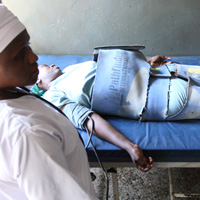
Total Awarded: $17 Million
Total Grants: 14
Duration: 2005 - 2014
Geographic Focus: India and Nigeria
Background
The Population and Reproductive Health program of the MacArthur Foundation has aimed to reduce postpartum hemorrhage in countries where maternal mortality is high. One focus of this program has been the use of anti-shock garment, a tool believed to help reduce death due to hemorrhage and revitalize work on maternal mortality. The Foundation’s portfolio included major grants to Pathfinder’s International for program implementation, the University of California San Francisco for clinical research on the anti-shock garment, as well as grants to other organizations.
What We Evaluated
The Foundation hired a team of independent evaluators to determine the perceived impact of this initiative in reducing postpartum hemorrhage in countries where maternal mortality is high. The evaluation included a desk review, site visits to India and Nigeria, and interviews with grantees and other stakeholders. The review focused on the impact of the anti-shock garment, its potential to reduce deaths from postpartum hemorrhage, and challenges for future deployment and scale-up.
What We Learned
Findings indicate that the anti-shock garment is a life-saving device; however, it fell short of expectations that it could impact mortality when used in isolation (i.e., without access to blood banks or surgeons). The garment played a positive role in attracting attention to the continuum of care package services that can contribute to the prevention of postpartum hemorrhage.



